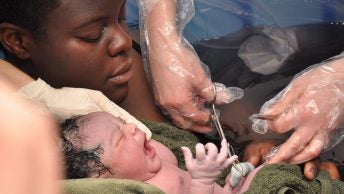By Vanessa Neergheen
Editor’s Notes: The studies reviewed in this article have been linked within the text. The findings described here should not be taken as a substitute for medical advice from a qualified health provider, and the evidence on COVID-19 in pregnant women and babies is continuing to evolve daily.
Epidemiologists like me use statistics to study who gets a disease and what causes it. My sister is pregnant with her second child, so the impact of COVID-19 on pregnant women and babies has been on my mind, both from a personal and professional perspective. I can’t imagine the anxiety pregnant women are dealing with right now, and I feel like there’s not much I can do to support my sister from a distance. However, with my background in epidemiology one thing I have been able to do is put my expertise to work and review emerging studies of pregnant women and COVID-19.
The current research on pregnant women is limited to a small number of cases from China who were diagnosed with COVID-19 in late January and early February. I chose to mainly focus on three studies of pregnant women from Chen et al., Zhang et al., and Zhu et al.; I also consulted an article by Dong et al. for more data specifically on infants. While the Chen et al., Zhang et al., and Zhu et al. studies are relatively small, at this time they’re among the larger studies of pregnant women and COVID-19; the larger a study is, the more data it’s based on, and the more confidence we can have in its results. It’s important to note that I didn’t systematically select these studies and that additional research exists that isn’t covered here.
Fever and cough were the first symptoms for most of the pregnant women, which is similar to the symptoms seen in non-pregnant women. These pregnant women also didn’t have more severe cases of COVID-19 than non-pregnant women. While a few women had vaginal deliveries, most women delivered via C-section, but often for reasons apart from COVID-19. Some of the women’s babies were tested for COVID-19 right after birth. All the infants were negative for the disease, which could suggest that COVID-19 isn’t transferred in the womb. Breast milk samples that were tested were also negative for COVID-19.
Keep in mind—these results are based on a small number of cases, so more research is needed to confirm these findings. The number of vaginal deliveries was particularly small. Additionally, because the women who were studied contracted COVID-19 during their last trimester, future studies should also see whether getting the disease earlier during pregnancy might have different outcomes.
One study that followed ten babies after birth found that some infants eventually developed COVID-19 following close contact with their mother or another infected family member. For these babies, COVID-19 sometimes caused negative consequences, like respiratory distress. Yet, a primary limitation of this finding is the small number of infants that were studied. In another larger study of 2,143 kids under 18 with COVID-19, children under one represented over 30% of the 125 severe and critical COVID-19 cases that the authors identified. However, the authors acknowledged that some of their suspected cases may actually have been caused by a different respiratory infection, like respiratory syncytial virus, which can make young children severely ill. Across the 389 children under one included in these two studies, there was only one death documented at the time of publication, and the baby that died was also preterm. This suggests that COVID-19 may adversely affect children under one, but with appropriate supportive care they will hopefully recover.
Current research suggests that pregnant women typically experience COVID-19 similarly to non-pregnant women. While infants who get COVID-19 after close contact with an infected person may have negative outcomes, in most cases they’re able to recover with supportive care. Researchers are still publishing new studies on COVID-19 in pregnant women and babies, so the preliminary findings described here are quickly evolving as additional evidence comes to light. Although there’s a lot to be anxious about, particularly for pregnant women, I personally have taken some comfort in the data and hope future studies find similar reassuring trends.
Vanessa Neergheen is a Statistical Analyst at Ariadne Labs where she assists programs with data analysis and interpretation. Prior to coming to Ariadne Labs Vanessa worked on multiple state health department surveillance projects, including the Pregnancy Risk Assessment Monitoring System (PRAMS). Besides crunching numbers, Vanessa enjoys baking and spending time with her dog, Pickles.



